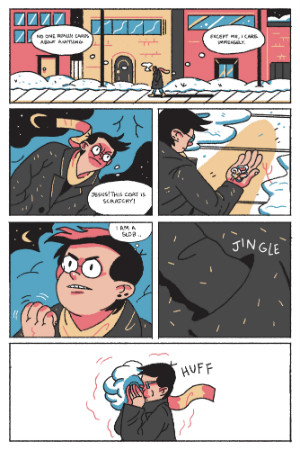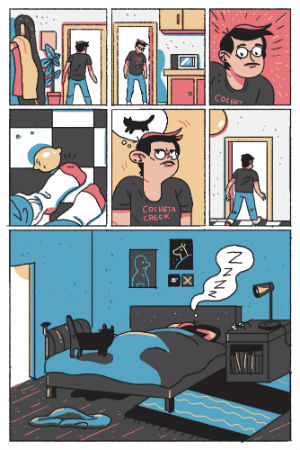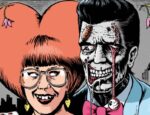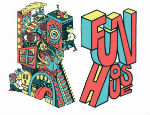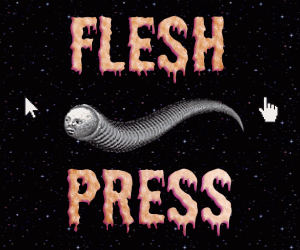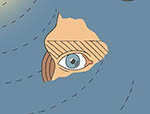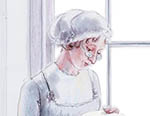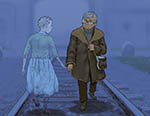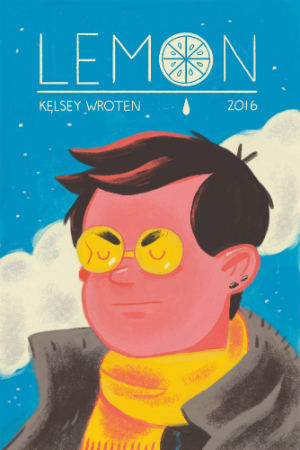 Lemon by Kelsey Wroten is a brief but potent distillation of her abilities as both a cartoonist and a writer. This minicomic from 2016 displays a strong talent for rendering performance and setting, as well as a masterful use of color. While the plot centers on a young woman’s solitary evening and morning after a party, Wroten’s ability to pick out and sharply focus the moments depicted allows the reader to consider their own predilections towards creating and savoring the sour segments of our lives.
Lemon by Kelsey Wroten is a brief but potent distillation of her abilities as both a cartoonist and a writer. This minicomic from 2016 displays a strong talent for rendering performance and setting, as well as a masterful use of color. While the plot centers on a young woman’s solitary evening and morning after a party, Wroten’s ability to pick out and sharply focus the moments depicted allows the reader to consider their own predilections towards creating and savoring the sour segments of our lives.
Our protagonist Emily spends the duration of the story entirely alone, save for the company of her cat Bristle. Though in another way we, the audience, serve as her companion. The opening pages follow Emily as she walks through the early morning cold back to her apartment after a whirling party for her friend whose book as been picked up by a publisher. This stroll is narrated by what at first appears to be an omniscient narrator, but is actually Emily speaking of herself in the third person.
The prose is novelistic here, in tune with Emily’s own literary aspirations. She jealously thinks to herself of her author friend, “people only want to read interesting, exciting stories not meaningful ones!” The meaningful story Emily seeks is the one she would like to be living in. The one she is narrating to both herself and the imagined invisible observer in hopes of giving it meaning. In truth her life is the simple pleasures of familiar smells, a warm bed, the hiss of the radiator, a bratty cat, a fresh cup of coffee, a well-worn t-shirt.
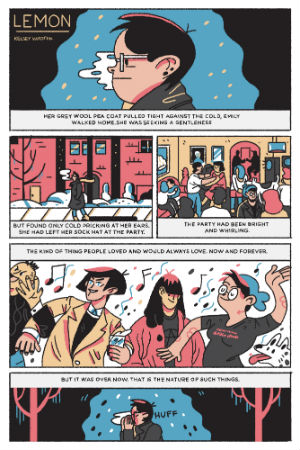 Spilling her morning coffee on her childhood Bible Camp shirt, Emily flashes back to her coming of age experience there. Having her first period as well as her heart racing at seeing another girl naked in the shower. Meditating on this and the experience of the previous night she resolves to write her own story in emulation of her soon to be published friend, but instead ends up passed out on the couch.
Spilling her morning coffee on her childhood Bible Camp shirt, Emily flashes back to her coming of age experience there. Having her first period as well as her heart racing at seeing another girl naked in the shower. Meditating on this and the experience of the previous night she resolves to write her own story in emulation of her soon to be published friend, but instead ends up passed out on the couch.
On a surface level what invests the reader in this story of Emily from 4am to 4pm is Wroten’s choices in rendering these small moments. The intense primary color palette jumps out first. Saturated red, blues, and yellows create a vibrant living world. Color is used in unexpected ways as shadows are cast in all three tones; a red tiger lounges among yellow trees, a black cat has blue spots. The combination of such an introspective story and bright cartoon-y style fully clicks when examining the emotiveness of Emily’s face. Her frustration at Bristle for knocking a lemon on the floor, her anger at an overly emotional text from Mark, her contained embarrassment in remembering her encounters at Bible Camp. All perfectly convey the unique gradations of emotions being felt. While the over cartoonish rendering of Bristle cements his status as the universal ridiculous pet cat.
Wroten also devotes special care to using her settings as a storytelling tool. The winter’s night is lonely, crisp, white, and scentless, filled with silent buildings and frozen skies. Emily’s cozy apartment is the made of the off-white walls, wacky posters, checkered kitchen tiles, and room filled by a bed familiar to many people in their 20s. The Bible camp shower area is nicely divided into the cool blue and white of Emily’s peeping place and the steamy yellow curtain and red silhouette of the girl showering.
Beneath this small story of a young woman and some of the more intimate details of her life is a deeper consideration on the human tendency to revel in that which we know to be unpleasant. The titular lemon that Bristle knocks on the kitchen floor comes full circle when Emily cuts herself a slice and sucks on it while considering writing her own story. Emily knowingly engages in this little bit of discomfort but it’s the sort of thing she has been doing the entire story.
She goes out that evening, “when she hadn’t even wanted to go to the party in the first place.” She walks home without her sock hat. She gives her number to “weird dudes” and then regrets when they text the next morning. Despite her claim that “I felt so weird,” about her experience at Bible Camp, she still wears the shirt over a decade later. Lemon is, then, a comic all about repeats. The recurring lemon, Emily’s childhood cat t-shirt featuring a cat that looks just like Bristle, the religious footprint poster mirrored and contrasted by the footprints left by the forbidden fruit of the girl in the shower. Emily flashes back to other embarrassing moments in her life because she is drawn again and again to their sour taste. She can’t help but further chew into that bitterness by imagining the stories she might write, even if they serve as reminders of the smallness of her life in comparison to the vastness of existence.
Emily’s struggle is our struggle. We are dealing with a reality that never matches our vision for our lives. We crave an existence that is profound and meaningful instead of mundane. Yet our greatest obstacle is more often than not our own human nature. Like Emily we lazily leave candy wrappers in our coat pockets, we go to parties we don’t even want to attend in hopes of making a romantic connection, we fritter away the afternoon watching YouTube, we dwell on the unhappy memory, we bite down on the lemon. It might be sour, but at least it’s a familiar taste. Like the cold night air and the hot cup of coffee, it reminds us we are alive.
Kelsey Wroten (W/A) • Self-Published, Available online here free
Review by Robin Enrico





